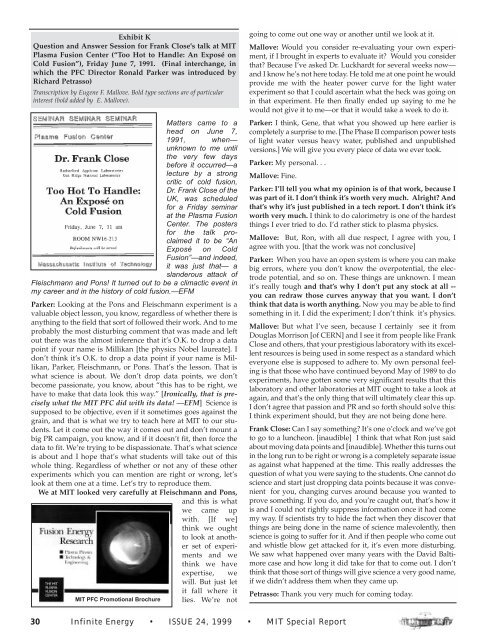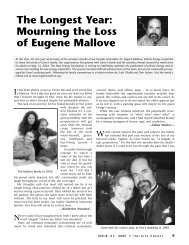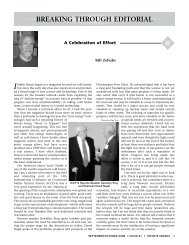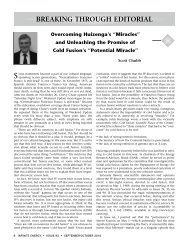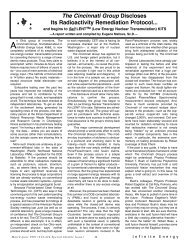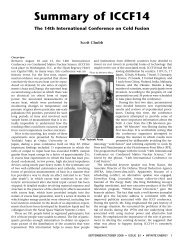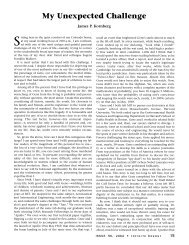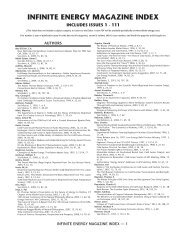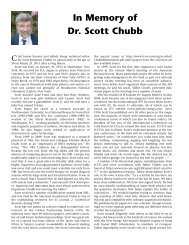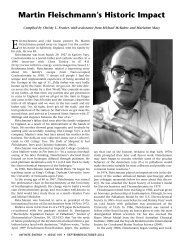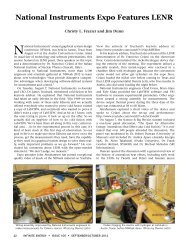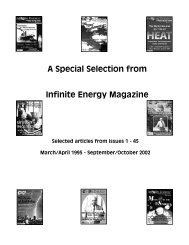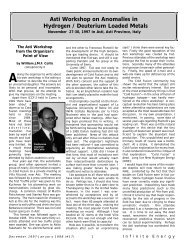MIT and Cold Fusion: A Special Report - Infinite Energy Magazine
MIT and Cold Fusion: A Special Report - Infinite Energy Magazine
MIT and Cold Fusion: A Special Report - Infinite Energy Magazine
You also want an ePaper? Increase the reach of your titles
YUMPU automatically turns print PDFs into web optimized ePapers that Google loves.
Exhibit K<br />
Question <strong>and</strong> Answer Session for Frank Close's talk at <strong>MIT</strong><br />
Plasma <strong>Fusion</strong> Center (“Too Hot to H<strong>and</strong>le: An Exposé on<br />
<strong>Cold</strong> <strong>Fusion</strong>”), Friday June 7, 1991. (Final interchange, in<br />
which the PFC Director Ronald Parker was introduced by<br />
Richard Petrasso)<br />
Transcription by Eugene F. Mallove. Bold type sections are of particular<br />
interest (bold added by E. Mallove).<br />
Matters came to a<br />
head on June 7,<br />
1991, when—<br />
unknown to me until<br />
the very few days<br />
before it occurred—a<br />
lecture by a strong<br />
critic of cold fusion,<br />
Dr. Frank Close of the<br />
UK, was scheduled<br />
for a Friday seminar<br />
at the Plasma <strong>Fusion</strong><br />
Center. The posters<br />
for the talk proclaimed<br />
it to be “An<br />
Exposé on <strong>Cold</strong><br />
<strong>Fusion</strong>”—<strong>and</strong> indeed,<br />
it was just that— a<br />
sl<strong>and</strong>erous attack of<br />
Fleischmann <strong>and</strong> Pons! It turned out to be a climactic event in<br />
my career <strong>and</strong> in the history of cold fusion.—EFM<br />
Parker: Looking at the Pons <strong>and</strong> Fleischmann experiment is a<br />
valuable object lesson, you know, regardless of whether there is<br />
anything to the field that sort of followed their work. And to me<br />
probably the most disturbing comment that was made <strong>and</strong> left<br />
out there was the almost inference that it’s O.K. to drop a data<br />
point if your name is Millikan [the physics Nobel laureate]. I<br />
don’t think it’s O.K. to drop a data point if your name is Millikan,<br />
Parker, Fleischmann, or Pons. That’s the lesson. That is<br />
what science is about. We don’t drop data points, we don’t<br />
become passionate, you know, about “this has to be right, we<br />
have to make that data look this way.” [Ironically, that is precisely<br />
what the <strong>MIT</strong> PFC did with its data! —EFM] Science is<br />
supposed to be objective, even if it sometimes goes against the<br />
grain, <strong>and</strong> that is what we try to teach here at <strong>MIT</strong> to our students.<br />
Let it come out the way it comes out <strong>and</strong> don’t mount a<br />
big PR campaign, you know, <strong>and</strong> if it doesn’t fit, then force the<br />
data to fit. We’re trying to be dispassionate. That’s what science<br />
is about <strong>and</strong> I hope that’s what students will take out of this<br />
whole thing. Regardless of whether or not any of these other<br />
experiments which you can mention are right or wrong, let’s<br />
look at them one at a time. Let’s try to reproduce them.<br />
We at <strong>MIT</strong> looked very carefully at Fleischmann <strong>and</strong> Pons,<br />
<strong>and</strong> this is what<br />
we came up<br />
with. [If we]<br />
think we ought<br />
to look at another<br />
set of experiments<br />
<strong>and</strong> we<br />
think we have<br />
expertise, we<br />
will. But just let<br />
it fall where it<br />
<strong>MIT</strong> PFC Promotional Brochure lies. We’re not<br />
going to come out one way or another until we look at it.<br />
Mallove: Would you consider re-evaluating your own experiment,<br />
if I brought in experts to evaluate it? Would you consider<br />
that? Because I’ve asked Dr. Luckhardt for several weeks now—<br />
<strong>and</strong> I know he’s not here today. He told me at one point he would<br />
provide me with the heater power curve for the light water<br />
experiment so that I could ascertain what the heck was going on<br />
in that experiment. He then finally ended up saying to me he<br />
would not give it to me—or that it would take a week to do it.<br />
Parker: I think, Gene, that what you showed up here earlier is<br />
completely a surprise to me. [The Phase II comparison power tests<br />
of light water versus heavy water, published <strong>and</strong> unpublished<br />
versions.] We will give you every piece of data we ever took.<br />
Parker: My personal. . .<br />
Mallove: Fine.<br />
Parker: I’ll tell you what my opinion is of that work, because I<br />
was part of it. I don’t think it’s worth very much. Alright? And<br />
that’s why it’s just published in a tech report. I don’t think it’s<br />
worth very much. I think to do calorimetry is one of the hardest<br />
things I ever tried to do. I’d rather stick to plasma physics.<br />
Mallove: But, Ron, with all due respect, I agree with you, I<br />
agree with you. [that the work was not conclusive]<br />
Parker: When you have an open system is where you can make<br />
big errors, where you don’t know the overpotential, the electrode<br />
potential, <strong>and</strong> so on. These things are unknown. I mean<br />
it’s really tough <strong>and</strong> that’s why I don’t put any stock at all --<br />
you can redraw those curves anyway that you want. I don’t<br />
think that data is worth anything. Now you may be able to find<br />
something in it. I did the experiment; I don’t think it’s physics.<br />
Mallove: But what I’ve seen, because I certainly see it from<br />
Douglas Morrison [of CERN] <strong>and</strong> I see it from people like Frank<br />
Close <strong>and</strong> others, that your prestigious laboratory with its excellent<br />
resources is being used in some respect as a st<strong>and</strong>ard which<br />
everyone else is supposed to adhere to. My own personal feeling<br />
is that those who have continued beyond May of 1989 to do<br />
experiments, have gotten some very significant results that this<br />
laboratory <strong>and</strong> other laboratories at <strong>MIT</strong> ought to take a look at<br />
again, <strong>and</strong> that’s the only thing that will ultimately clear this up.<br />
I don’t agree that passion <strong>and</strong> PR <strong>and</strong> so forth should solve this:<br />
I think experiment should, but they are not being done here.<br />
Frank Close: Can I say something? It’s one o’clock <strong>and</strong> we’ve got<br />
to go to a luncheon. [inaudible] I think that what Ron just said<br />
about moving data points <strong>and</strong> [inaudible]. Whether this turns out<br />
in the long run to be right or wrong is a completely separate issue<br />
as against what happened at the time. This really addresses the<br />
question of what you were saying to the students. One cannot do<br />
science <strong>and</strong> start just dropping data points because it was convenient<br />
for you, changing curves around because you wanted to<br />
prove something. If you do, <strong>and</strong> you’re caught out, that’s how it<br />
is <strong>and</strong> I could not rightly suppress information once it had come<br />
my way. If scientists try to hide the fact when they discover that<br />
things are being done in the name of science malevolently, then<br />
science is going to suffer for it. And if then people who come out<br />
<strong>and</strong> whistle blow get attacked for it, it’s even more disturbing.<br />
We saw what happened over many years with the David Baltimore<br />
case <strong>and</strong> how long it did take for that to come out. I don’t<br />
think that those sort of things will give science a very good name,<br />
if we didn’t address them when they came up.<br />
Petrasso: Thank you very much for coming today.<br />
30 <strong>Infinite</strong> <strong>Energy</strong> • ISSUE 24, 1999 • <strong>MIT</strong> <strong>Special</strong> <strong>Report</strong>


